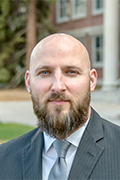


Select one of the options below:
CSU's online Master of Music Therapy degree helps you connect with others, learn about important research developments in the field, and apply music in a more systematic way, to reenergize and enhance your practice as a music therapist.
Advance your career as a music therapist with CSU's nationally recognized online Master of Music Therapy degree. Through your course of study, you will advance your practice using music therapy to address the physical, psychological, cognitive, and social needs of individuals. In this program, you will:
Develop your skills as a music therapist by focusing on evidence-based techniques that promote changes in cognitive, sensorimotor, communication, and psychosocial functioning. Apply the latest neuroscience and music research to guide clinical decisions and deliver optimal, individualized treatment. In the CSU Master of Music Therapy program, you will strengthen your clinical decision-making skills to:
CSU faculty bring their cutting-edge research and clinical expertise directly into your online courses, providing a current and evidence-based learning experience. You’ll learn from leaders in the field, with faculty specializing in areas such as:
In this episode, we talk with two faculty members in CSU’s Music Therapy department: Dr. Blythe LaGasse and Dr. Jess Rushing. We learn about the healing power of music, why music therapy works, and how it fits into a holistic healthcare system.
With this graduate degree, you will take a wide variety of courses in music therapy and related areas. This program includes 15 credits of required music therapy courses. The program also includes 15 credits of electives, allowing students to choose coursework that will best fit their professional and educational needs. Required courses are delivered online and all music therapy courses are designed for the working music therapy professional.
Select fifteen elective credits, with options including:
Elective credits can also be selected from areas including Biomedical Sciences, Education Research Methods, Psychology, and more. You work with your advisor to customize the plan based on your interests and learning needs. The common final exam is required for all Plan B Master of Music Therapy students.
This graduate degree is delivered online, with one four-day, on-campus intensive in Fort Collins, CO.
This program gives you the flexibility to complete the same degree offered on campus, but from the comfort of your own home, and at your own pace. The typical program for a full-time music therapist includes two classes per semester, with degree completion possible in five to six semesters (including a minimum of one summer semester).
Your level of interaction with the faculty and fellow students depends on the specific course. Many courses involve active communication with other professional music therapists on discussion boards, group chats, and/or group projects. Online course instructors will provide you with online office hours and email contact.
This course is designed to help music therapy professionals gain a better understanding of research in order to critically read and participate in research. Students will learn the components of designing, conducting, and disseminating a research project. Emphasis will be placed on quantitative research methodology and applicable statistical testing. Students will learn how to use methodologies that are commonly applied in the clinical setting with small and large populations. Students will have the opportunity to conduct their own research project, resulting in a research article and research poster presentation.
Students have the opportunity to explore their own composition and improvisation skills as they relate to facilitating music therapy sessions. They explore topics in music theory, composition, and improvisation, and incorporate those concepts into compositions and improvisations. Music recording technology is also explored in this course.
In this course, students have the opportunity to gain an in-depth understanding of the history of music therapy. Beginning in the 1700s and ending in present-day music therapy practice, students are exposed to early pioneers, learn about the original scientific studies in music therapy, and encounter some very interesting individuals and ideas along the way.
This course is designed to provide students with the historical and scientific foundations of neuroscience in music therapy (including foundations in neurologic music therapy). Concepts covered will include the biological foundations of music, current developments in the neurosciences of music, biomedical research in music, and current scientific evidence for clinical practice.
This course is designed to provide the working music therapist with experience in advanced practice. Students will discuss topics in clinical practice including the incorporation of current neuroscience research and evidence-based protocols. Students will receive hands-on instruction during one long weekend at CSU. This course will provide students with a unique opportunity to further their knowledge of clinical techniques while receiving advanced instruction from the CSU faculty. During the four-day on-campus component, students work together to solve clinical problems, work through different techniques and protocols, and further their understanding of advanced music therapy practice.
This course is designed to further the working music therapist's clinical skills. The student will practice music therapy techniques while working in their selected population. Students will record current clinical work and will submit video for review by the CSU faculty, receiving written feedback and suggestions for further development of their clinical practice.
Get a glimpse of students' experiences, discover how online education benefits them, and hear what they say about CSU's faculty and courses.
See how the program has allowed Tina to participate in the program while living and working in Tennessee, and how it has improved her practice as a music therapist at a veterans' hospital.

Dr. Blythe LaGasse is coordinator and professor of music therapy at Colorado State University. She is director of the online program in music therapy. She has been a music therapist specializing in working with neurodiverse children for over twenty years. She is an active researcher and is Co-Director of the Brainwaves Research Lab, where she is researching neural aspects of music engagement.
Dr. LaGasse was a faculty trainer for the Neurologic Music Therapy (NMT) Academy for eight years. She holds a certificate of proficiency in DIR/Floortime from the Interdisciplinary Council on Development and Learning. Dr. LaGasse has publications in Frontiers in Integrative Neuroscience, the Journal of Music Therapy, Music Therapy Perspectives, and Music and Medicine. She was the 2016 recipient of the American Music Therapy Association Arthur Flagler Fultz Research grant award and in 2016 she and co-investigator Dr. Erik Johnson were awarded the GRAMMY Foundation grant award.
Dr. LaGasse was the 2015 recipient of the American Music Therapy Association Research Award. She was the 2016-2017 recipient of the College of Liberal Arts Excellence in Teaching Award. She was the Fall 2017 recipient of the CSU Online Innovative Educator Award.

Dr. Andrew Knight holds a bachelor's degree in percussion performance, with a jazz emphasis, from UW-La Crosse, a music therapy equivalency and master's degree from the University of Minnesota, and a Ph.D. in educational foundations and research from the University of North Dakota (UND).
Dr. Knight has research interests in substance use disorders in adults and early childhood social/emotional developmental issues. He directs the Parkinson's Disease vocal exercise group in collaboration with the Parkinson's Support Group in Larimer County and is a Music Together Within Therapy™ provider. His research has been published in the Journal of Music Therapy and Music Therapy Perspectives, among other journals, and serves as Associate Editor for Book Reviews for JMT. He is the 2017-2019 president of the Midwestern Region (MWR) of the American Music Therapy Association (AMTA), on the AMTA Assembly of Delegates, and has won the MWR and AMTA Service Awards. Along with Dr. Blythe LaGasse and Dr. Alicia Clair, he is a co-editor of the 2018 Introduction to Music Therapy textbook published by AMTA.

Lindsey Wilhelm holds degrees in music therapy from Colorado State University (BM) and the University of Iowa (MA, Ph.D.). A board-certified music therapist since 2007, Dr. Wilhelm has worked with both children and adults in a variety of community, educational, rehabilitative, and medical settings. Her current research areas and interests include music therapy applications for aging adults with hearing loss; students' self-care practices; and music therapy applications for family caregivers.
As a student in CSU's online music therapy master's program, you receive the same education, learn from the same faculty, and earn the same regionally accredited degree as students on campus. Additionally, you can expect:
Learn more about CSU's rankings and accolades.
Students may be admitted for the fall and spring semester. Summer admission is not available.
| Fall semester | July 1 |
| Spring semester | November 1 |
Start your application online and upload materials directly into the online system. You can save your progress and return any time.
Apply NowThe music therapy (M.M.T.) degree requires applicants to have the following:
Note that meeting the minimum department standards does not ensure admission to the program. Admission to Colorado State University graduate programs is based on a number of factors, including prior academic and professional experience and the personal statement.
Prepare the materials below and upload when you apply online.
Complete the online graduate application form and pay the nonrefundable application processing fee (payable online). As soon as you have completed the required information, please submit your application. Your application will not be reviewed until it is complete and all required materials have been received.
CSU's Graduate School offers several application fee waiver opportunities. Visit their website to determine if you are eligible for a waiver.
Request one official transcript of all collegiate work completed from all institutions attended. Transcripts from Colorado State University are not required. Transcripts must be received directly from the originating institution to be considered official.
Please Note: Students may be unconditionally admitted and registered in their first semester of courses with an unofficial transcript. Official transcripts must be submitted, prior to or during your first semester, before you can register for your second semester of graduate work. Failure to meet this condition will result in your dismissal from the Graduate School.
Electronic (preferred): Digital Transcripts must be submitted by the originating institution using a secure service such as parchment, eScrip-Safe, the National Student Clearinghouse, or e-Quals. Transcripts received via emails are considered unofficial. Use institution code 4075 for Colorado State University or gradadmissions@colostate.edu if the secure service requires an email address.
Mail (if necessary) Graduate Admissions Colorado State University – Office of Admissions 1062 Campus Delivery Fort Collins, CO 80523-1062
View your application status at any time to ensure your application checklist is complete or to check on updates.
Once your complete application, including supporting materials, is received, the department admission committee will review your application and notify you of their decision.
Proof of English language proficiency is required for applicants from countries or United States territories where there are official languages other than (or in addition to) English. This includes the U.S. territories of American Samoa, Guam, the Northern Mariana Islands, and Puerto Rico.